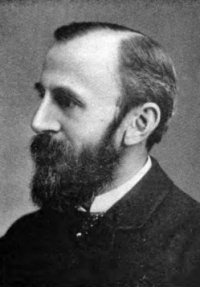George Clement Bertram was born in St Helier in 1841 and educated at Victoria College and Sherborne before going to Trinity, Cambridge. He was called to the Jersey bar in 1863 and the English bar two years later. He practiced as a lawyer until 1877 in Jersey and then for two years in England, before returning to the island to take up the position of Solicitor-General, a position he held only for a year before being appointed Attorney-General in 1880. Four years later he was appointed Bailiff and he was knighted in 1885 by Queen Victoria at Osborne.
In the best traditions of the States of Jersey and Royal Court he was soon involved in friction with his officials. The Viscount, Gervase Le Gros, twice left the island without telling the Bailiff, as provided for in his patent, and was severely censured for this, and for failing to produce a Home Office letter. However, he was later granted a new patent releasing him from this obligation.
Release of prisoner
Next Bertram clashed with Lieut-Governor Lieut-General Charles Ewart over the release of a French prisoner from prison. Marie Francoise Daniel had been convicted of an offence but found insane and was being held awaiting the Queen's pleasure. On 26 January 1890 an order for her release was received from the Home Office and the Viscount went to the prison. The jailer contacted the Bailiff, who refused to let her go until the warrant had been registered in Court.
Five days later General Ewart went to the prison and released the woman in the jailer's absence, leading to a hearing before the Privy Council, at which his actions were upheld on the basis that "a pardon by the Sovereign is an exercise of Royal Prerogative which operates immediately, and requires no further act to make it effective".
Prison Board
In the meantime, another dispute had arisen over who should chair the Prison Board. Every Bailiff had taken the chair since its inception in 1837, but in February 1890 General Ewart demanded to take the chair instead of the Lieut-Bailiff in the Bailiff's absence.
It might have been thought that by now the Privy Council and the Island had resolved their differences and worked out what the relationship was between them, and also that Lieut-Governors knew where they stood in relation to island affairs. But that was far from the case, and a complicated legal action brought everything to a head again.
The dispute went to the Privy Council, which ordered on 23 June 1891 that the Lieut-Governor should preside at any meeting of the board at which he was present. This flew in the face of previous rulings about the relative positions of the Bailiff and Lieut-Governor, particularly in relation to civil affairs, and the Royal Court refused to register the order and referred it to the States. The States petitioned the Crown, seeking to have the order overturned.
At the eventual hearing before a very distinguished body of Privy Councillors including the Lord Chancellor, both English Law Officers and the Attorney-General for Jersey, W H Venables Vernon, represented the Crown. Robert Haldane QC appeared for the States. Haldane’s brilliant career at the Bar and in politics was crowned by his appointment as Lord Chancellor in 1912.
On 23 May 1894 the hearing began. After some time Haldane was interrupted by the Lord Chancellor and asked to deal first with the question whether the 1891 Order constituted a substantial departure from the arrangement constituted consensually by the 1837 Order and ought on that ground not to be sustained. The following day the English Solicitor-General addressed the Council. Haldane was not called upon to reply, and the councillors subsequently advised Queen Victoria that the 1891 Order should be withdrawn. On 27 June 1894 an Order-in-Council was issued recalling the 1891 Order. Argument was thus never heard on some of the interesting points which arose from the mass of material collected in the pleadings.
Family
Sir George resigned due to ill health in 1898 and lived for another 17 years, dying in London. He had married Anna Maria Lawder, daughter of General E Lawder in 1866. They had no children.
After his death the Jersey Times wrote:
- "In every office which he held under the Crown he performed his public functions with marked ability and independence of character".
Family tree
| Predecessor | Successor | |
| Sir Robert Marett 1880-1884 |
Sir George Bertram 1884-1898 |
Sir William Vernon 1899-1931 |

